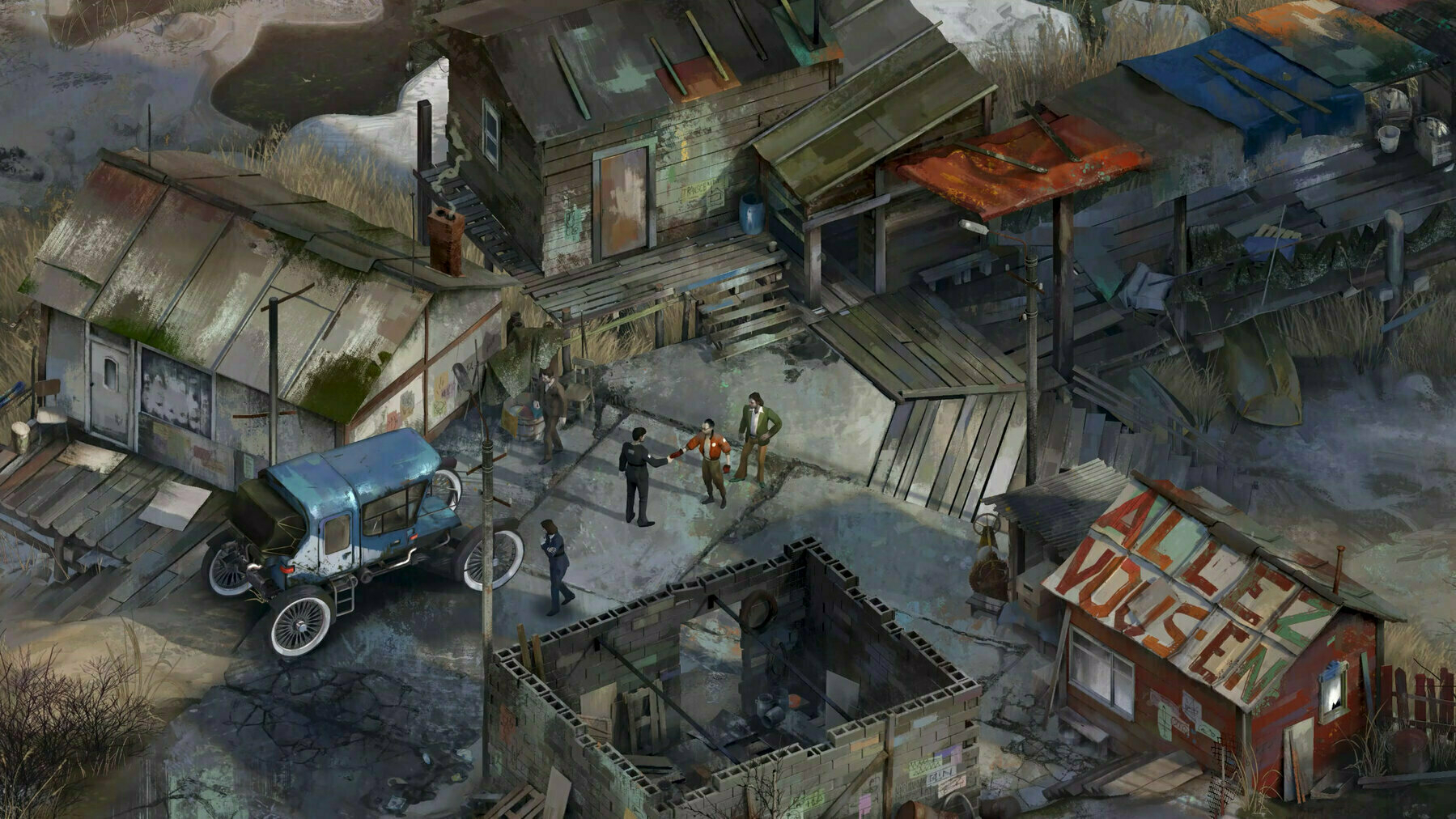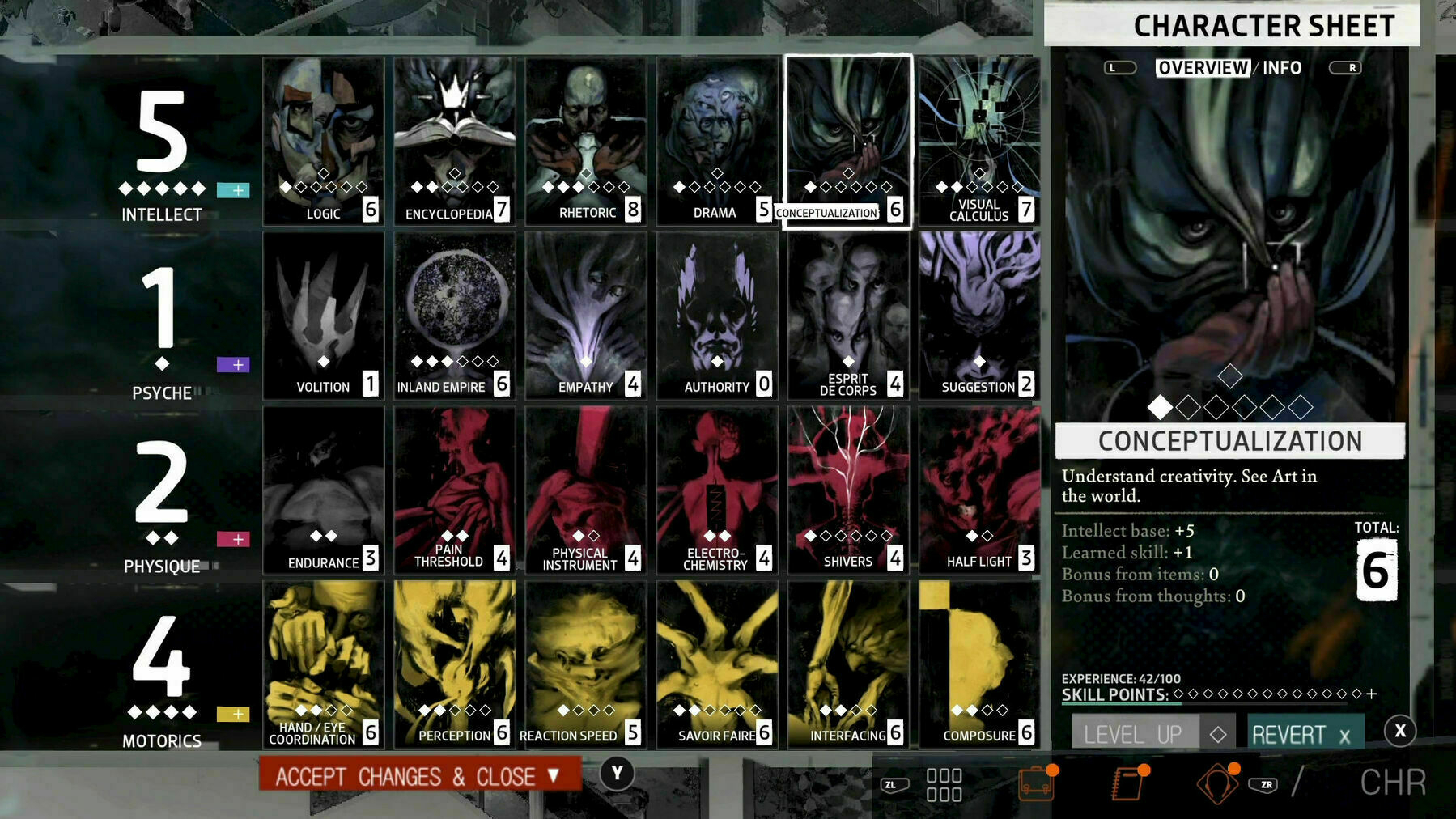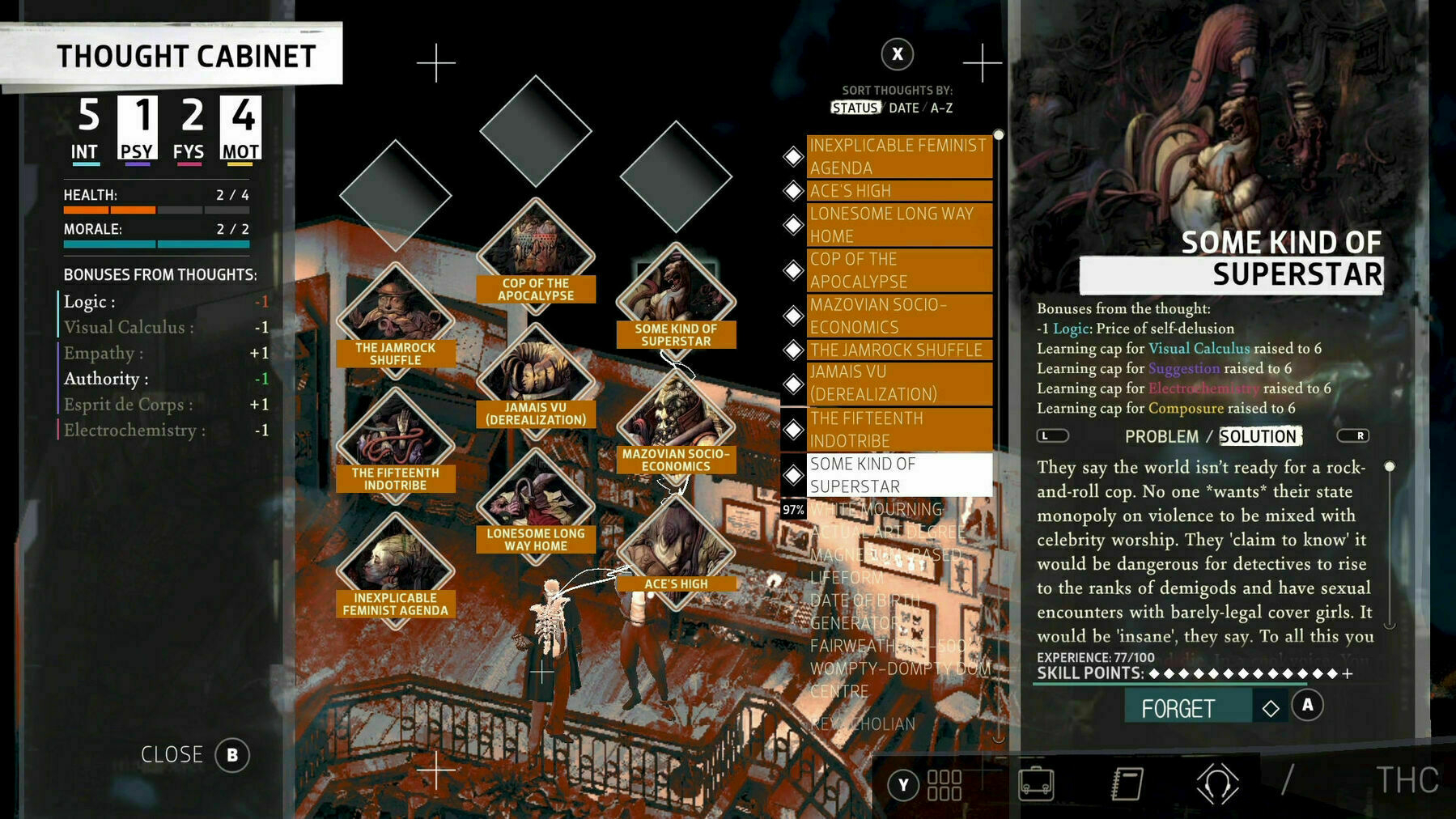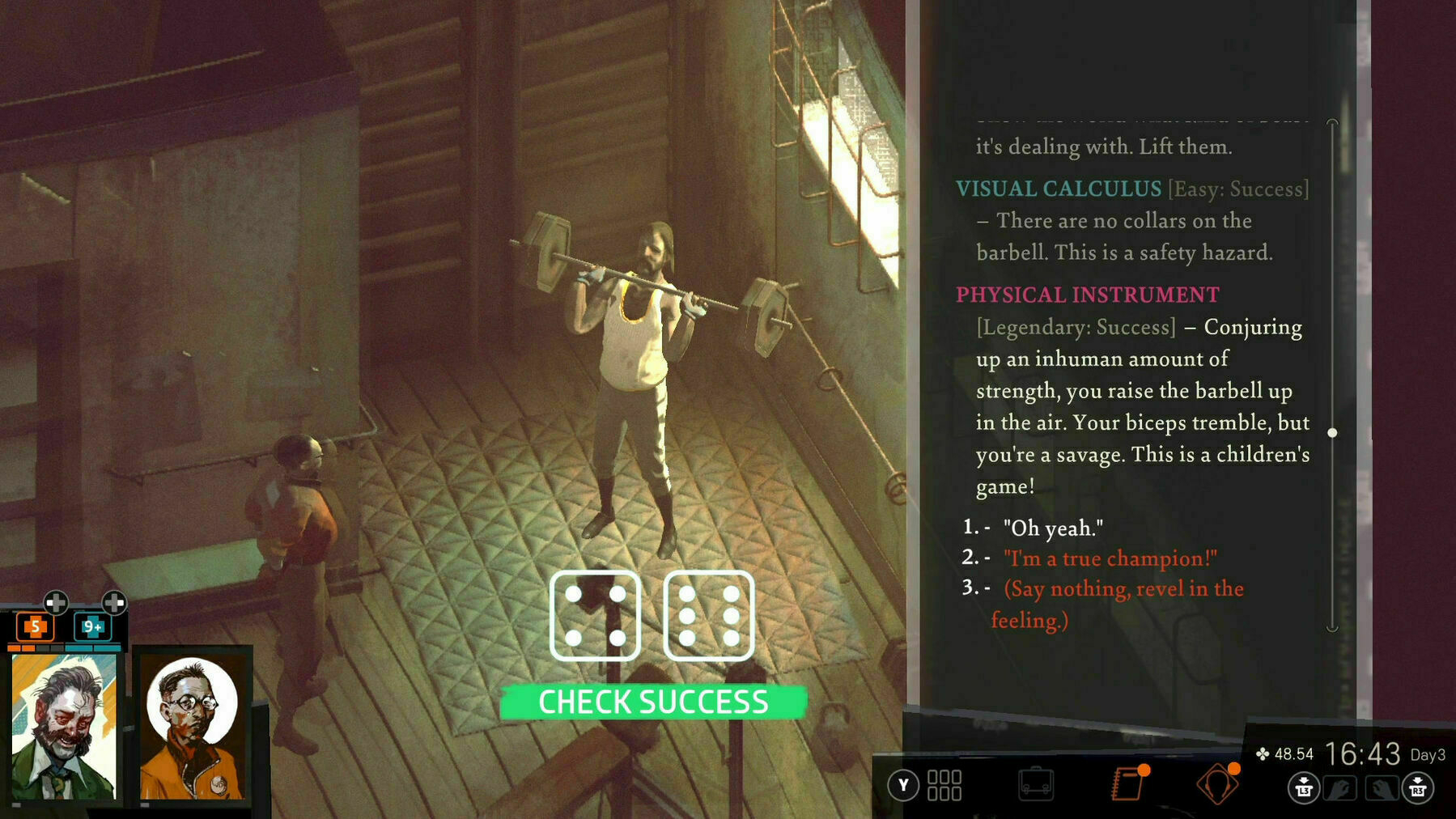🎮 Played Disco Elysium - The Final Cut.
This was the first time I’d played a game quite like this, if indeed there are all that many games quite like this. It was quite an experience.
Set in Revachol, a somewhat failing post-communist state, you wake up in a hotel room with a debilitating hangover and no memory of, well, very much at all. Some might say it’s therefore quite an accurate simulation of parts of some of our real lives.

(Please note that all the screenshots I’m sharing here are from RPGfan.com - I was far too engaged to remember to take my own.)
Slowly, as you point-and-click your way around your new locale, you find ways to piece together what happened the previous night, and indeed some of the previous nights of your life. It transpires that you’re a detective who is there to solve a murder. Much of this is done via talking to other people, many of whom are less than friendly - particularly those who are in reality running the town through tactics of intimidation.
There is an incredible amount of reading to be done. There over a million words worth of text all in all, although in the deluxe version of the game - “The Final Cut” - it’s all voice-acted out as well if you prefer to listen than read. Apparently a million words is like reading The Lord of the Rings and The Hobbit twice through. But, don’t panic, you won’t end up needing to read them all. In fact I doubt you’d even have the option to come close to doing so in a single playthrough even if you wanted to.
So the dialogues are lengthy. But they’re also meaningful. I’ve only played it through once, but your choices of how to respond at least appear to make a real difference to how people treat you later in the game, what opportunities are available to you and, I suspect, the ending.
I soon learned the error of my ways in following that classic RPG-style tactic of mindlessly working my way through every single dialogue option, saying everything the game allowed me to say in the hope the responses would provide clues. That doesn’t work well in the world of Revachol any more than it would in real life. So I started taking my choices more seriously, in order to further the in estimation but also to manage my own (character’s) brain.
“Brain management” is a big part of how you develop your character in this game. Firstly, your survival depends on you managing to sustain both your physical and mental health. At first I found my character losing all motivation for life, let alone detective work, which ended up with me living homeless, under a bridge, rarely sober. That’s the end of the game if you’re not a little careful. Luckily you can save your game pretty much whenever you want so I didn’t have to start all the way over.
You can temporarily boost your physical or mental resilience in an emergency via taking recreational drugs, if you have any and don’t object to doing so - although if your police partner is there they are not the sort of person who’s impressed by such behaviour. And there will be a price to pay in some other aspect of your wellbeing.
For a more permanent form of self-development, you earn points as you progress through the game which you can channel into the development of your brain and body. There are 24 attributes such that fit under 4 categories - intellect, psyche, physique and motorics - that you can elect to improve depending on how you wish to develop your character. Some examples: logic, drama, empathy, pain threshold, reaction speed. Each attribute has various available skill levels.

Your brain state may then influence the choices you can make during dialogue, how other people react to you, how successful you in any actions you choose to make or even what actions or side-quests are available to you - after all you can’t dig into a clue if you never noticed it in the first place.
Your starting set of attributes is dependent on which archetype you choose for your character pre-game. You can opt for a physically strong brawny detective, one with high emotional intelligence or a Sherlock Holmes style character with a high IQ sort of setup.
Another way in which your brain is relevant comes via the mechanism of thoughts. Throughout the game you’ll pick up semblances of ideas. You can choose to dwell on these thoughts, to research them, to “do your own research” as it were. But, like reality, you can only focus on a few at any given time, even when you get over the immediate anguish of your hangover.

These thoughts have quite abstract names “Anti object task force”, “Rigorous self-critique”, “The Jamrock shuffle”, so you never quite know for sure how thinking these thoughts is going to affect you. Some will improve your abilities. Some might make you worse at something. Others are neutral. This seems an accurate reflection of the risks of Googling too hard on some topics in the real world.
Reading books can also have an effect. The final main modifier to your abilities come from your decisions around what to wear. Your wardrobe grows over time as you find or otherwise acquire a large range of outfits each of which can influence your abilities a little.
There’s a lot going on here, but, at least in my experience, little to panic about. I certainly didn’t make the optimum choices but did just fine once I got over my quitting and living under a bridge phase.
The one thing I’d note is that at times the game makes clear that if you follow a certain action or go to a certain place then there’s no going back. To be fair it’s very explicit. But they’re warnings you should heed.
You may well end up with a vast collection of sub-missions as you play, some of which are pertinent to the main quest of murder-solving, others of which are merely interesting diversions. You might do yourself out of the ability to work on a few of the latter type if you disregard such warnings. Unfortunately via being a bit careless around this I failed to complete one of the larger side-quests available in at least the deluxe version of the game - to re-instantiate a successful incarnation of communism (other ideologies are available).
All in all, this was a fascinating and absolutely engaging game of a type I’ve never played before. It was at times slow, bewildering, or frustrating as probability determined I failed to accomplish something I wanted to - some actions' success are dependent on a classic Dungeons-and-Dragons style roll of a dice with the threshold you need to achieve being modified by your character’s personal abilities.

There’s some parts that could be termed tedious or depressing, but I imagine that’s deliberate. It conveyed the atmosphere of the location very well. Indeed this was one of the most successfully atmospheric games I’ve played.
It was, in short, a real, deep and intense experience and one I’m glad I had. A real example of the capability of games to be art. I certainly agree with the many accolades and awards the game won back in the day. I’d be very keen to see if any more examples of this kind of genre and approach are out there.